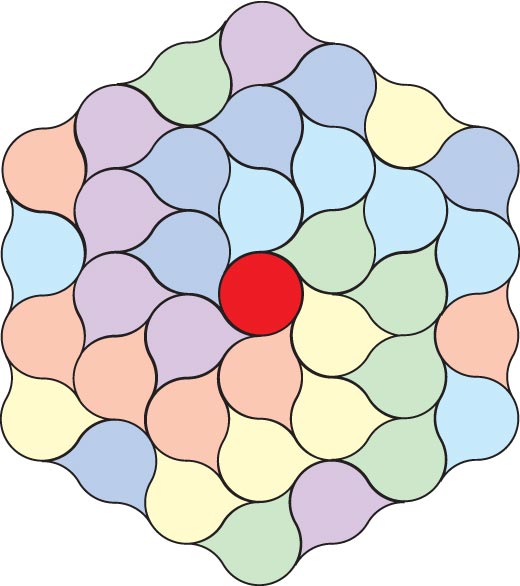 |
Introduction Site Map Main Project Email: jja@nac.net |

— Stanislaw Lem, Solaris


Monday, January 10th, 2005
I got distracted by some puzzles during the past week, but some art did come of it. An interesting tiling problem was posed on the Grey Labyrinth discussion board, and Laura and I had several cracks at it. You can view the thread in question here. I generated vector art in Adobe Illustrator to show what we did.
I have a bit more to say about this, but I'm up at 3 AM again, so I'll post the rest Monday evening. Until!
Update: I am a poor student of math, which puts me at a disadvantage when dealing with tesselation puzzles, but I have a strong spatial/visual sense which somewhat makes up for it. Fortunately, my lack of skill at speaking the language of mathematics does not bar me from obtaining some small pleasure and doing some small good. When you catch a ball or fold a sheet, you're doing mathematics whether you like it or not...
Just about everything that happens in the universe can be expressed in mathematical language. This does not of course mean that mathematics is the source of everything that happens in the universe; it is a powerful tool for describing and understanding, which does lead astray a certain kind of thinker: those who hold that describing a thing well means that you now understand everything else about it - its 'purpose,' its limits, its presence in various philosophies. I think that defining something well in no way plants any obligations upon that thing; one has made a neural model of the thing, which if accurate bestows immense power, but which carries no great ontological weight. I've seen the same sort of sloppy thinking arise from debaters who read out a dictionary definition of a word, then act as if they have pinned the word flat, forgetting that usage constrains dictionaries more than dictionaries constrain usage. A dictionary is a guide to the state of the language at the time it was written; it is not meant to be a straightjacket for thought, regardless of how ardently the timid-minded wish otherwise.
I've rambled a bit, and I would like to get to sleep early tonight, so I'll close things here, along with one of my unproven attempts at a solution to the puzzle mentioned above:




pageatatime.com is hosted by net access corporation - www.nac.net